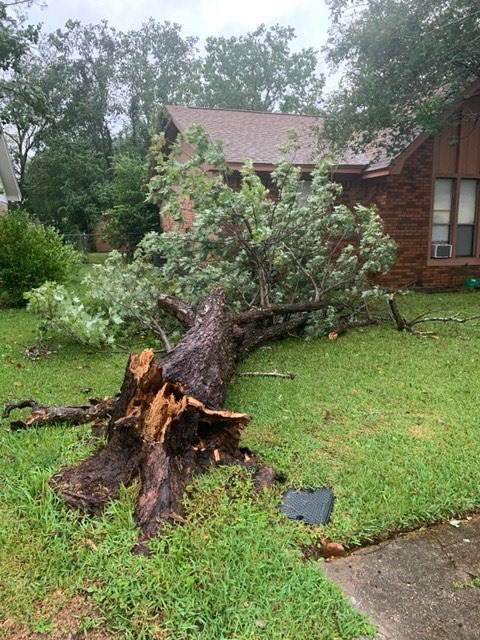
A fallen tree pictured Tuesday, September 15 in east Navarre (submitted photo)
...TROPICAL-STORM-FORCE WINDS CONTINUE TO SPREAD ONSHORE ALONG THE NORTH-CENTRAL GULF COAST... ...HISTORIC LIFE-THREATENING FLOODING LIKELY ALONG PORTIONS OF THE NORTHERN GULF COAST... SUMMARY OF 700 PM CDT...0000 UTC...INFORMATION ---------------------------------------------- LOCATION...29.6N 88.0W ABOUT 75 MI...125 KM S OF MOBILE ALABAMA ABOUT 75 MI...125 KM SW OF PENSACOLA FLORIDA MAXIMUM SUSTAINED WINDS...80 MPH...130 KM/H PRESENT MOVEMENT...N OR 350 DEGREES AT 2 MPH...4 KM/H MINIMUM CENTRAL PRESSURE...975 MB...28.79 INCHES WATCHES AND WARNINGS -------------------- CHANGES WITH THIS ADVISORY: None SUMMARY OF WATCHES AND WARNINGS IN EFFECT: A Storm Surge Warning is in effect for... * Mouth of the Mississippi River to the Okaloosa/Walton County Line Florida * Mobile Bay A Hurricane Warning is in effect for... * East of Bay St. Louis Mississippi to Navarre Florida A Tropical Storm Warning is in effect for... * East of Navarre Florida to Indian Pass Florida * Bay St. Louis Mississippi westward to Grand Isle Louisiana A Storm Surge Warning means there is a danger of life-threatening inundation, from rising water moving inland from the coastline, during the next 36 hours in the indicated locations. For a depiction of areas at risk, please see the National Weather Service Storm Surge Watch/Warning Graphic, available at hurricanes.gov. This is a life-threatening situation. Persons located within these areas should take all necessary actions to protect life and property from rising water and the potential for other dangerous conditions. Promptly follow evacuation and other instructions from local officials. A Hurricane Warning means that hurricane conditions are expected somewhere within the warning area. Preparations to protect life and property should be rushed to completion. A Tropical Storm Warning means that tropical storm conditions are expected somewhere within the warning area within 36 hours. For storm information specific to your area, including possible inland watches and warnings, please monitor products issued by your local National Weather Service forecast office. DISCUSSION AND OUTLOOK ---------------------- At 700 PM CDT (0000 UTC), the center of Hurricane Sally was located by an Air Force Reserve Hurricane Hunter aircraft and NOAA Doppler radar near latitude 29.6 North, longitude 88.0 West. Sally is moving toward the north near 2 mph (4 km/h). A slow northward motion is expected tonight, followed by a slow north-northeastward to northeastward motion on Wednesday and Wednesday night. A slightly faster northeastward motion is expected on Thursday. On the forecast track, the center of Sally will approach the northern Gulf Coast tonight, and make landfall in the hurricane warning area late tonight or Wednesday. Sally is expected to move inland across southeastern Alabama Wednesday night and Thursday. Maximum sustained winds are near 80 mph (130 km/h) with higher gusts. Little change in strength is forecast until landfall occurs, and Sally is expected to be a dangerous hurricane when it moves onshore along the north-central Gulf Coast. Hurricane-force winds extend outward up to 40 miles (65 km) from the center and tropical-storm-force winds extend outward up to 125 miles (205 km). A sustained wind of 55 mph (89 km/h) and a gust to 70 mph (113 km/h) were recently reported at Petit Bois Island, Mississippi. A sustained wind of 54 mph (87 km/h) and a gust to 66 mph (106 km/h) were recently reported on Dauphin Island, Alabama. The minimum central pressure estimated from Air Force Hurricane Hunter aircraft observations is 975 mb (28.79 inches). HAZARDS AFFECTING LAND ---------------------- Key messages for Sally can be found in the Tropical Cyclone Discussion under AWIPS header MIATCDAT4 and WMO header WTNT44 KNHC, and on the web at www.hurricanes.gov/text/MIATCDAT4.shtml RAINFALL: Sally is forecast to produce 10 to 20 inches of rainfall with isolated amounts of 30 inches along and just inland of the central Gulf Coast from the Florida Panhandle west of the Apalachicola River to far southeastern Mississippi. Historic life-threatening flash flooding is likely. In addition, this rainfall will lead to widespread moderate to major flooding on area rivers. Sally is forecast to turn inland Wednesday and track across the Southeast producing rainfall of 4 to 8 inches, with isolated maximum amounts of 12 inches, across portions of southeastern Mississippi, southern and central Alabama, central and northern Georgia, and the western Carolinas. Significant flash and urban flooding is likely, as well as widespread minor to moderate flooding on some rivers. STORM SURGE: The combination of a dangerous storm surge and the tide will cause normally dry areas near the coast to be flooded by rising waters moving inland from the shoreline. The water could reach the following heights above ground somewhere in the indicated areas if the peak surge occurs at the time of high tide... Dauphin Island, AL to AL/FL Border including Mobile Bay...4-6 ft Mouth of the Mississippi River to Mouth of the Pearl River including Lake Borgne...3-5 ft MS/AL Border to Dauphin Island, AL...3-5 ft AL/FL Border to Okaloosa/Walton County Line, FL including Pensacola Bay and Choctawhatchee Bay...3-5 ft Mouth of the Pearl River to MS/AL Border...2-4 ft Lake Pontchartrain and Lake Maurepas...2-4 ft Okaloosa/Walton County Line, FL to Chassahowitzka, FL including Saint Andrews Bay...1-3 ft Grand Isle, LA to Mouth of the Mississippi River...1-3 ft The deepest water will occur along the immediate coast in areas of onshore winds, where the surge will be accompanied by large and damaging waves. Surge-related flooding depends on the relative timing of the surge and the tidal cycle, and can vary greatly over short distances. For information specific to your area, please see products issued by your local National Weather Service forecast office. WIND: Hurricane conditions are expected to begin within the hurricane warning area later this evening. Tropical storm conditions are already occurring in portions of the warning areas, and will continue through Wednesday night. TORNADOES: A few tornadoes may occur through Wednesday across portions of the Florida Panhandle and southern Alabama. SURF: Swells from Sally will continue to affect the coast from the Florida Big Bend westward to southeastern Louisiana during the next couple of days. These swells are likely to cause life-threatening surf and rip current conditions. Please consult products from your local weather office.





































